Key takeaways:
- Choosing the right app development tools enhances creativity and productivity, reducing frustration and development time.
- Front-end frameworks like React, Angular, and Vue.js streamline the development process, allowing developers to focus on innovation rather than repetitive tasks.
- Key criteria for selecting a framework include the learning curve, performance, and community support, all of which significantly impact the development experience.
- Personal experiences with frameworks highlight the importance of resilience and how overcoming challenges can lead to deeper appreciation and confidence in coding skills.
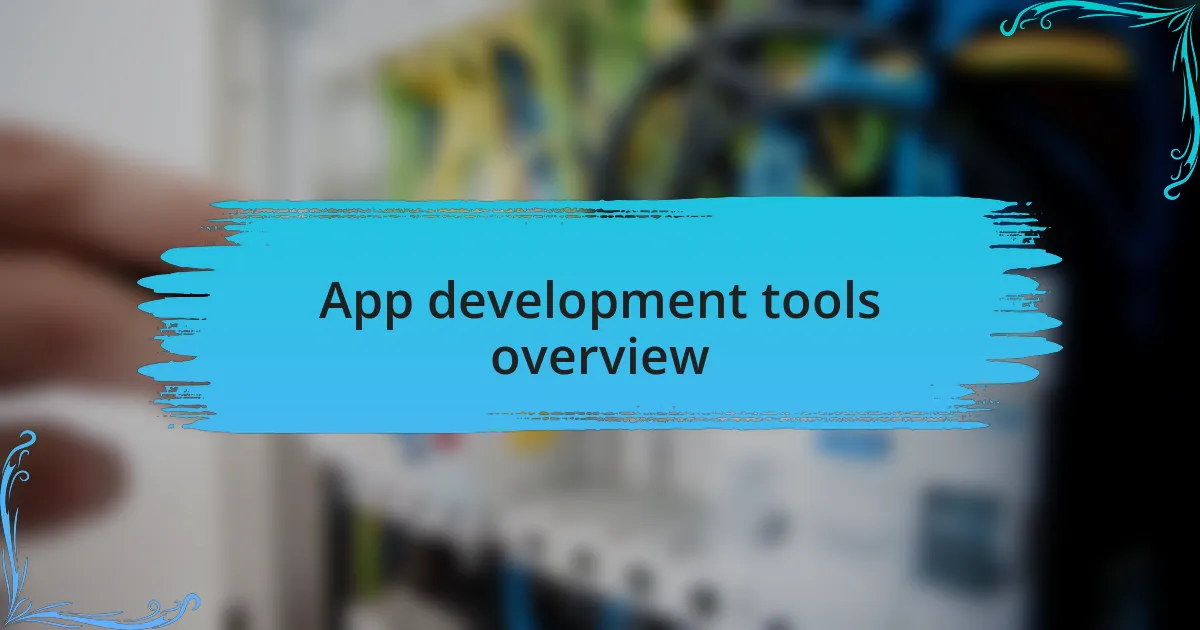
App development tools overview
When I think about app development tools, I often reflect on how they’ve transformed the way we create software. The variety of frameworks, libraries, and platforms available today can seem overwhelming. I remember my first experience with a new tool; it felt like stepping into a whole new world where my ideas could come to life more efficiently than ever before.
These tools are not just about code; they’re about enhancing creativity and productivity. I’ve found that the right framework can significantly reduce development time and increase the joy of building something from scratch. Have you ever struggled with a project just because the tools weren’t right? That frustration can be disheartening, and it underscores how crucial it is to choose the best app development tools for your needs.
Moreover, the collaboration features present in many modern tools have changed the game for teams. I recall working on a group project where real-time collaboration allowed us to iterate quickly, share ideas instantly, and ultimately create a product that exceeded our expectations. It’s these experiences that highlight the importance of selecting the right tools for seamless teamwork and enhanced outcomes.
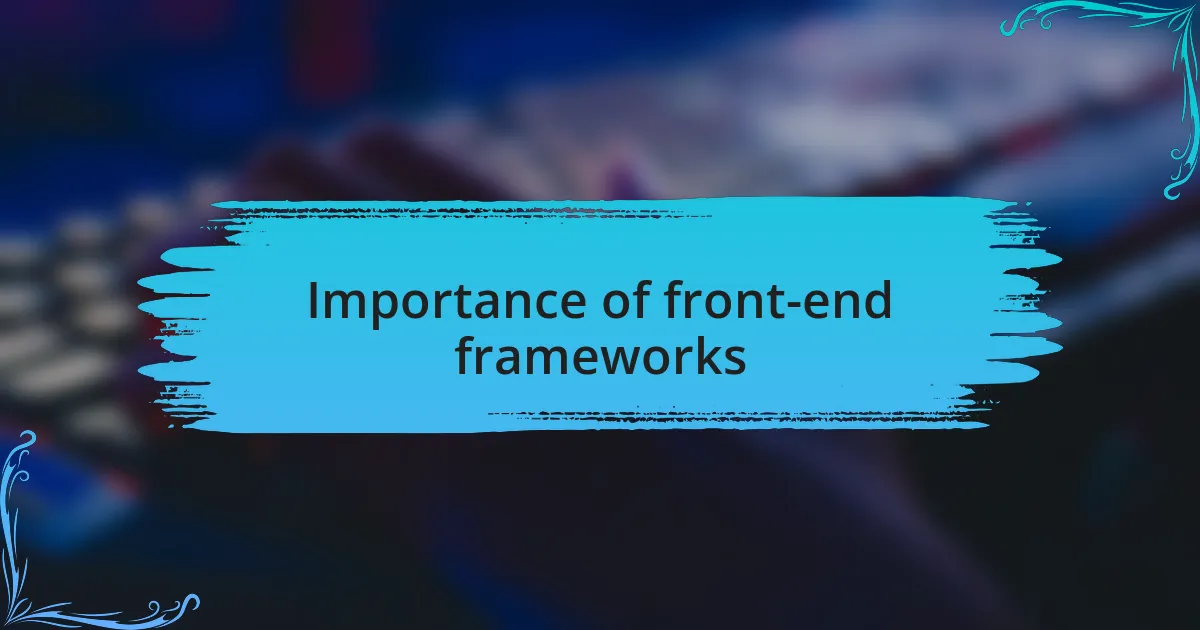
Importance of front-end frameworks
When I consider the importance of front-end frameworks, I realize they act as a solid foundation for any app. They streamline the development process by providing a set structure, which can lead to fewer bugs and more consistent performance. I remember a project where I initially tried building everything from scratch. It felt exciting, but the chaos soon got overwhelming. If I had opted for a framework, I would have saved time and sanity.
Using a front-end framework empowers developers to focus on creativity rather than getting bogged down by repetitive coding tasks. One time, I was working on a user interface that required complicated animations. By leveraging a framework, those animations became relatively easy to implement. Have you ever wished for a magic wand that can let you skip the tedious parts of coding? That’s precisely what frameworks do; they allow us to concentrate on the fun and innovative aspects of app development.
In addition, front-end frameworks often come with community support and a wealth of resources. I vividly recall a moment when I hit a wall while coding and turned to a forum dedicated to the framework I was using. The wealth of knowledge and shared experiences from other developers not only helped me troubleshoot my issue but also made me feel connected to a larger community. Isn’t it reassuring to know that you’re not on this journey alone?
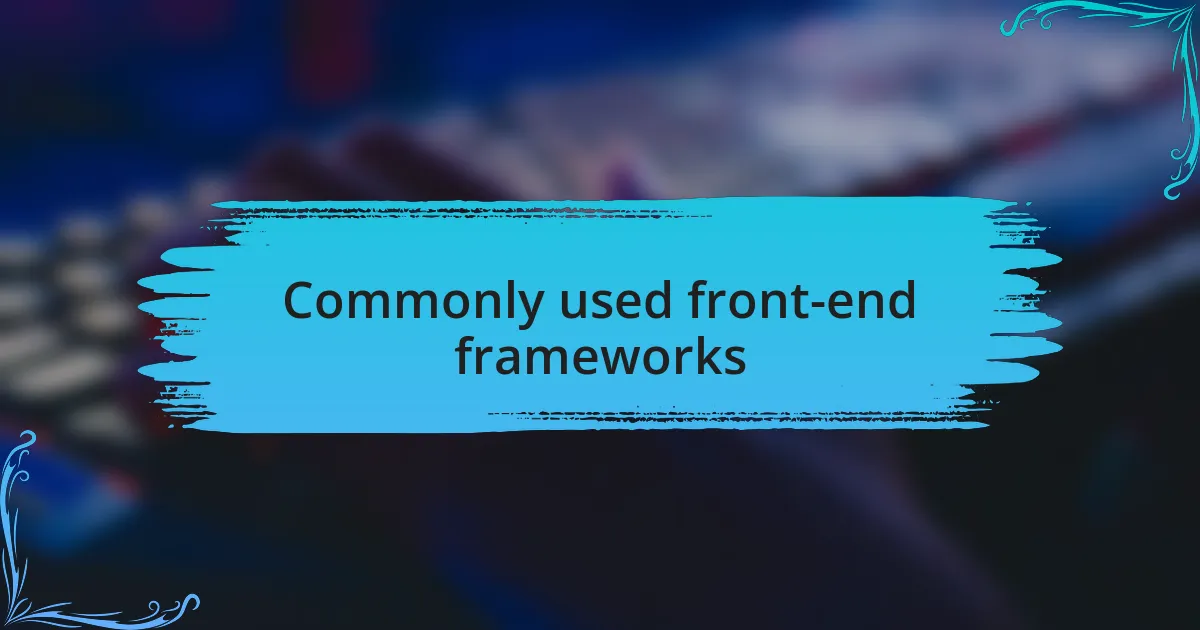
Commonly used front-end frameworks
Commonly used front-end frameworks include React, Angular, and Vue.js, all of which have carved their niche in the development community. In my experience, React’s component-based architecture has made it a go-to choice for building dynamic user interfaces. I remember a project where I was able to reuse components effectively, which not only sped up development but also ensured consistency across the application.
Angular, on the other hand, caught my attention during a project that required a robust solution for managing complex data flows. Its two-way data binding feature truly impressed me, making real-time updates a breeze. Have you ever worked on an app where data handling felt clunky? Angular helped me avoid that pitfall by streamlining interactions, allowing me to focus more on user experience rather than backend intricacies.
Vue.js is another framework worth mentioning, especially for those who appreciate a gentle learning curve. I recall onboarding a new teammate who picked it up surprisingly fast, and it was gratifying to watch them create stunning interfaces in no time. Isn’t it amazing how the right tools can empower not just seasoned developers, but also beginners? The appeal of such frameworks lies in their ability to help teams collaborate effortlessly, enhancing productivity across the board.
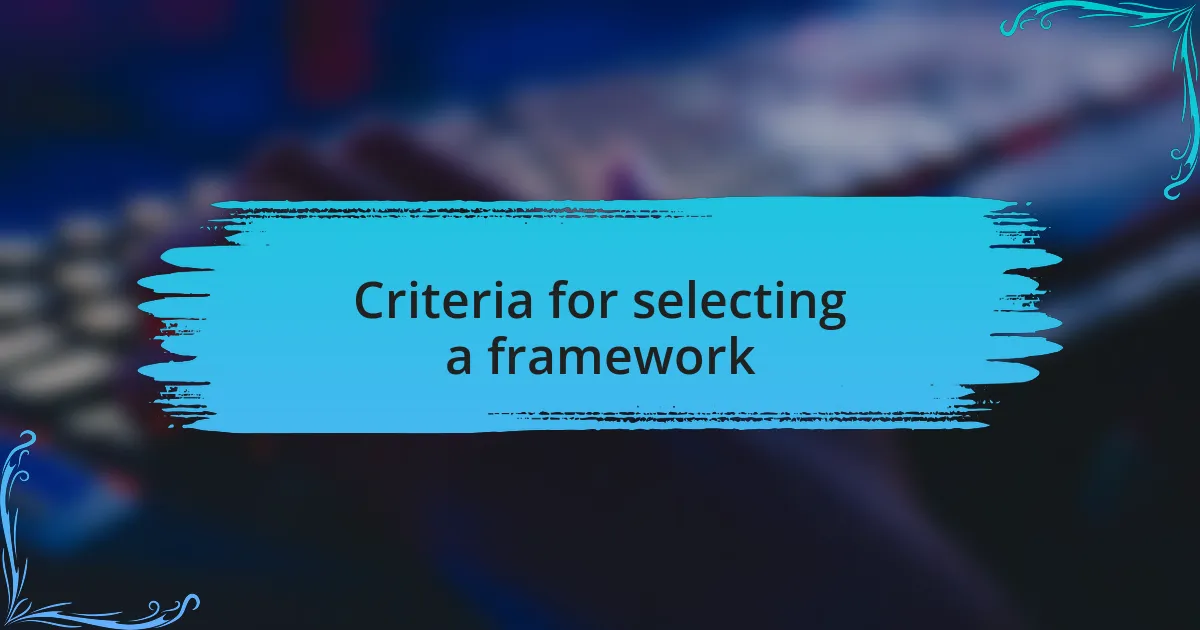
Criteria for selecting a framework
When selecting a front-end framework, I always consider the learning curve as a key criterion. I once dived headfirst into a complex framework only to find myself overwhelmed. Had I chosen a more familiar framework, I could have saved valuable time and frustration, allowing me to focus on creating an efficient user experience instead.
Performance is another essential factor. I remember working on a project where loading times were critical, and I opted for a lightweight framework that delivered excellent speed. The result? Users reported a much-improved experience, and that immediate feedback was uplifting. Who doesn’t want to create applications that leave users impressed right from the first click?
Finally, community support cannot be overlooked. Early in my career, I relied heavily on community forums and resources to troubleshoot issues. When I chose a framework with a passionate community, it made problem-solving so much easier. Have you felt the relief of finding solutions just a few clicks away? Having that support network truly enhances one’s confidence and overall development experience.
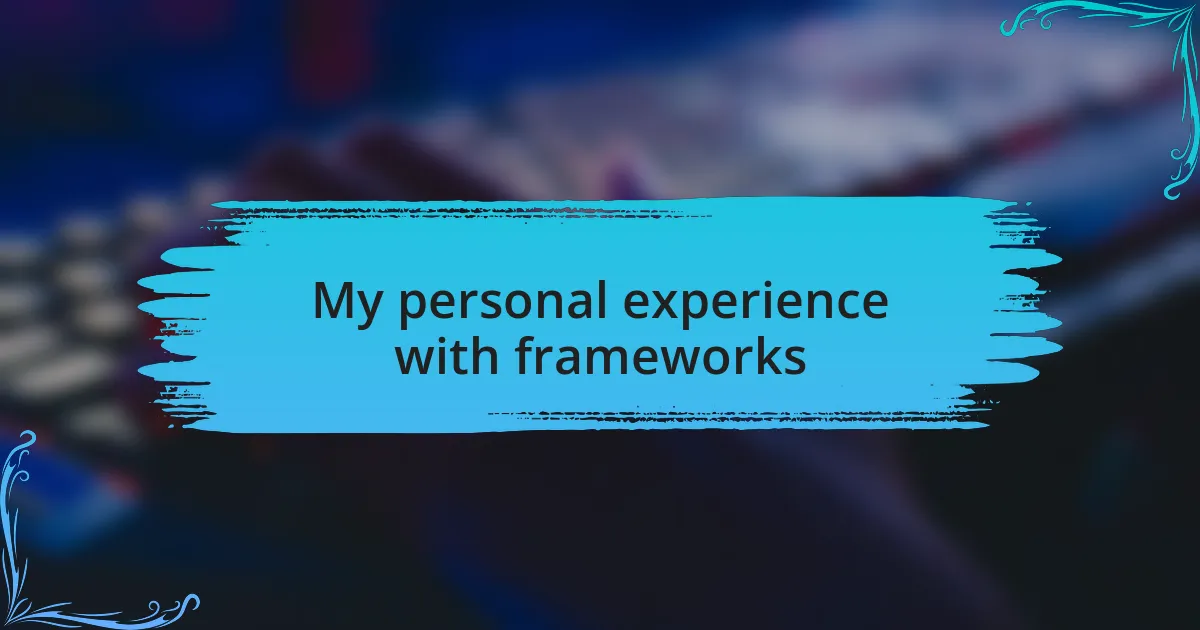
My personal experience with frameworks
When I first started experimenting with different frameworks, I was fascinated by how each one had its unique quirks. I remember trying out React for the first time and being excited yet apprehensive as I navigated through its component-based architecture. It felt like learning a new language; every new concept brought a mix of exhilaration and confusion, but gradually, I found that the more I tinkered, the more I grasped its potential.
One particular experience that stands out is when I switched to Vue.js for a small project. Initially, I was skeptical since I had invested so much time in other frameworks. However, as I got deeper into its simplicity and flexibility, I felt a weight lift off my shoulders. It was liberating to build something intuitively without constantly battling the framework itself. Have you ever had tools that just clicked for you? That’s how I felt.
Diving into Angular was another wild ride. I had high hopes, but I quickly found myself tangled in its complexity. There were days I felt defeated, questioning whether I should stick with it or abandon ship for something easier. However, pushing through that challenging phase taught me resilience. Now, I see those struggles as a rite of passage that ultimately made me a more competent developer. Has your journey with frameworks taught you resilience like mine?
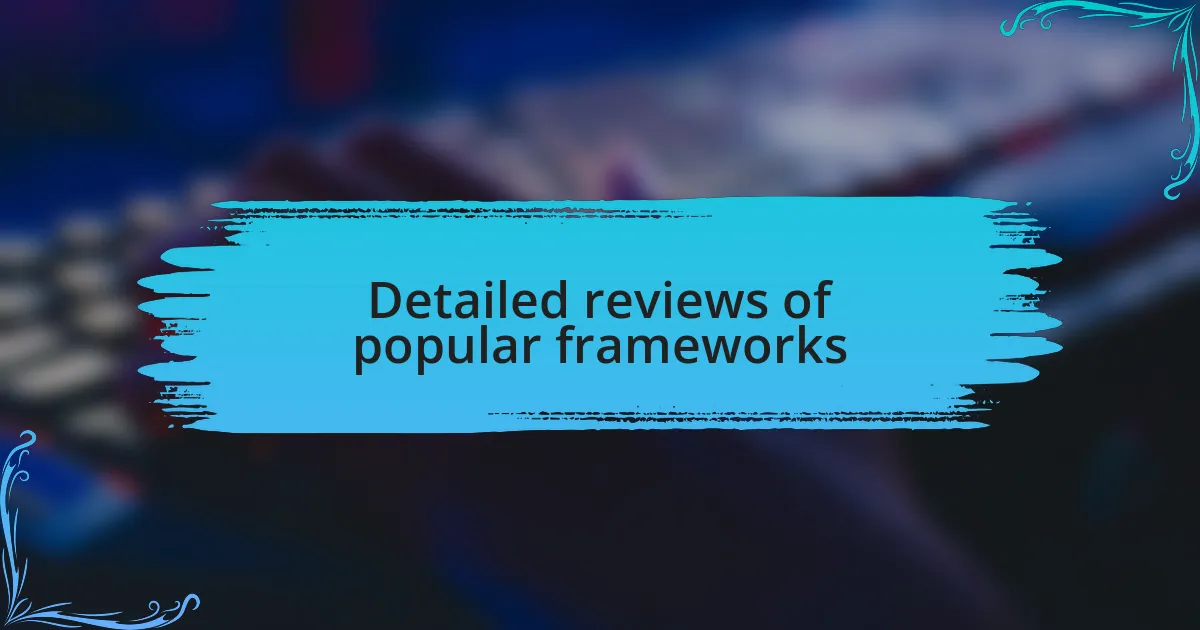
Detailed reviews of popular frameworks
When it comes to React, I found myself captivated by its vast ecosystem and the strength of its community. One day, as I was building a dynamic user interface, I stumbled upon hooks. The moment I grasped how they allowed for cleaner and more manageable code, it felt like stumbling upon a treasure chest. Have you ever uncovered a feature that changed how you approached a project entirely? That revelation about hooks certainly changed how I structured my applications and made me more confident as a developer.
Switching gears to Vue.js, I vividly recall the moment I transferred an existing project into this framework. The simplicity of the syntax felt like wrapping myself in a warm blanket on a chilly day. It was a breath of fresh air after wrestling with React’s intricacies. This experience taught me the importance of having a seamless developer experience and how it can significantly impact your productivity. Does working with a clean and straightforward framework help you find joy in coding, too?
Angular was quite the emotional rollercoaster for me. I remember diving into a complex app, and the sheer amount of boilerplate code left me overwhelmed. Yet, something magical happened as I persisted—I started to appreciate what the framework offered in terms of structure and scalability. The learning curve was steep, but as I began mastering its concepts, I felt a surge of pride. I’ve realized that tackling challenging frameworks can lead to a deeper appreciation of their capabilities. Have you felt similarly in your own coding adventures?
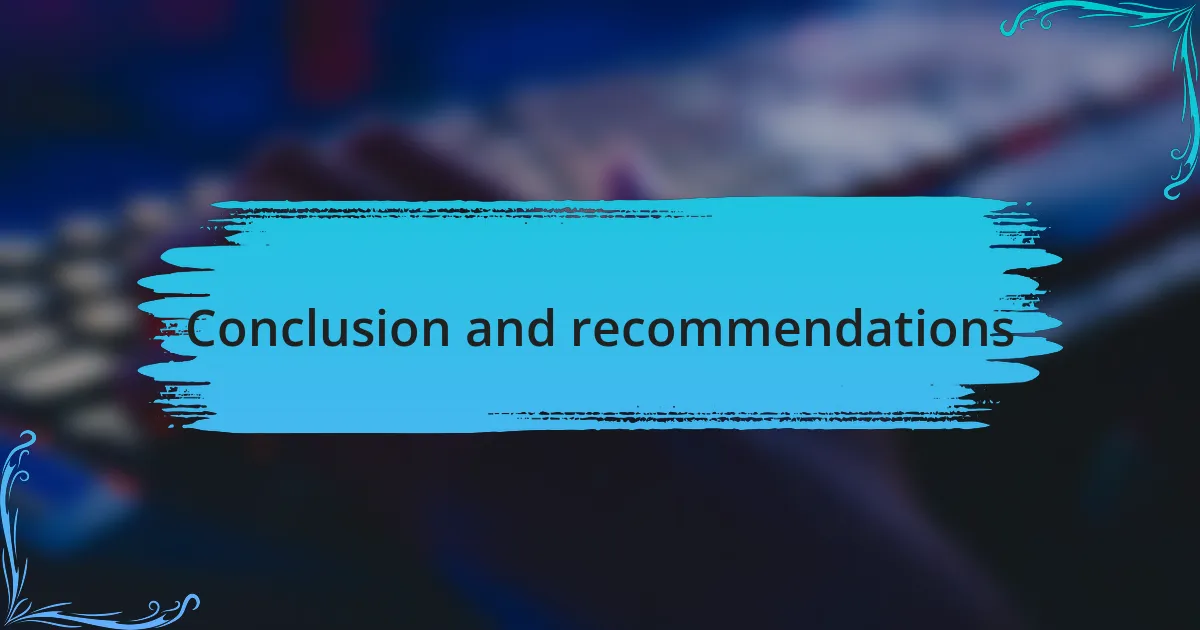
Conclusion and recommendations
In choosing a front-end framework, I suggest considering not only your project requirements but also your personal preferences and past experiences. For instance, if you thrive on community support and extensive resources, React might be your best bet. On the other hand, if you value simplicity and rapid development, Vue.js could offer the embrace you’ve been looking for.
After navigating each framework, I learned that my comfort zone heavily influenced my choices. For example, while Angular’s complexity once intimidated me, it ultimately provided tools that led to robust applications. What if you embrace a framework that challenges you? It might just push your capabilities to new heights.
Ultimately, I recommend trying out mini-projects in each framework to see firsthand which resonates with you most. When I experimented this way, it deepened my understanding and made my final choice much clearer. Isn’t it fascinating how a simple exercise can lead to such impactful insights about our coding journey?